Looking ahead to the 2016 Scottish Parliament elections
- Published

A fresh group of MSPs will be elected to the Scottish Parliament in May
With the possible exceptions of Rab C Nesbitt and Granpaw Broon, the title of Scotland's greatest philosopher is generally accorded to David Hume.
And certainly Hume sparkled brilliantly during that quite remarkable 18th century flowering of Caledonian intellectual genius.
However, the great man was not always appreciated by conventional society. His sceptical attitude towards religion, for example, counted against him when it came to obtaining salaried employment in academia.
He noted drily that, despite his prodigious written output, he had "no enemies, except indeed all the Whigs, all the Tories, and all the Christians."
Hume also observed: "Nothing is more surprising than the easiness with which the many are governed by the few."
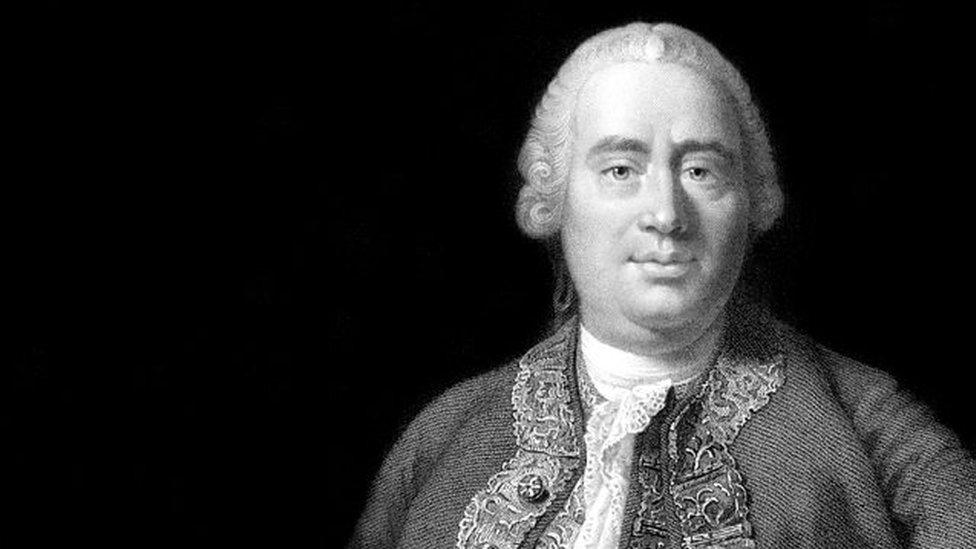
David Hume faces stiff competition from Grandpaw Broon in the philosophical stakes
Now, I am certain that our Holyrood tribunes are to the fore in commending Hume's intellect and wit. I am sure that they recognise his huge role in global thought.
But right now they are about to confront the concept of the exercise of power as they seek, once more, to "govern the many".
These and other vague recollections occurred to me as I noted the forthcoming programme of the David Hume Institute, the splendid Edinburgh organisation which commemorates the great man by fostering contemporary political, philosophical and economic debate.
Their agenda for the early months of 2016 includes, in order, the following speakers: Scottish Labour leader Kezia Dugdale, Scottish Greens co-convener Patrick Harvie, Scottish Tory leader Ruth Davidson, Scottish Lib Dem leader Willie Rennie and, finally, the recently confirmed SNP leader and First Minister Nicola Sturgeon.
Their topic? "My vision of Scotland for the next five years."
Scottish elections
Right now, of course, they are firmly focused upon the next five months, leading up to the Scottish Parliamentary elections in May.
But their chances of relative victory in those polls will depend substantially on public reaction to the "vision thing", due to be set out in their Hume lectures and elsewhere. After exhaustive (and exhausting) conflict through the referendum and the UK elections, the parties are now seeking to replenish their strategic tanks.
It is intriguing - but not surprising - to note the extent to which comments from the opposition parties at Holyrood are predicated on the prospect, almost the presumption, of continuing SNP success.
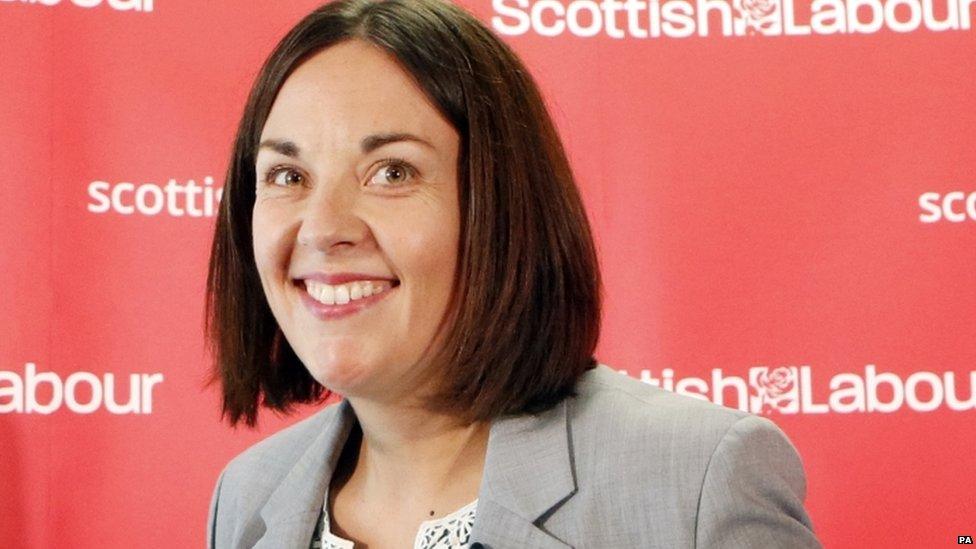
Scottish Labour leader Kezia Dugdale is first up in the Hume programme
Consider Kezia Dugdale, first up in the Hume programme. Right now, her Labour comrades are understandably expending energy in getting themselves as high up their party's Holyrood regional lists as possible.
Ms Dugdale decided to reopen the lists, removing the special status accorded to sitting MSPs. In addition to those, there are one or two eager ex MPs who rather fancy an early return to elected politics.
But why on the list and not a first-past-the-post seat? Why seek regional election and not a constituency? Because, of course, Labour stands to win relatively few Holyrood constituencies if current opinion poll indications are borne out. And of course, they won just one seat at last May's general election.
It is an indication of the party's present difficulties that there is such an almighty scramble to obtain nomination via the regional lists - especially when one recalls that, in the very earliest days of devolution, some Labour figures tended somewhat to denigrate the status of list MSPs.
However, Labour has to play the hand currently on the table and Kezia Dugdale is determined to do so with vigour and panache.
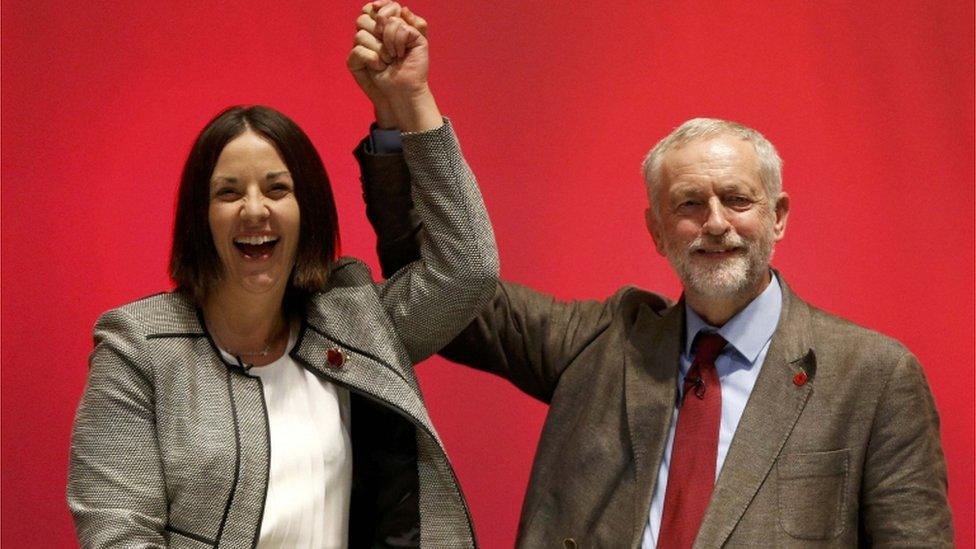
Is the rise of Jeremy Corbyn a good thing for Labour in Scotland?
Self-evidently, Labour's pitch has to be founded on the existing pre-eminence of the SNP. They have to gain a hearing from the people of Scotland before attempting to subvert and then supplant their chief rivals.
In that regard, does it help having Jeremy Corbyn as leader of the UK Labour Party? Some insiders say yes: that it places Labour, definitively, to the left of the SNP in pitching for traditional, proletarian support.
Others say no: that voters see him as a less than credible contender for high office. Either way, Ms Dugdale is adamant. This is her shout. This is her election. She will drive Scottish Labour's offer.
Electoral strategy
Their strategy is, of course, multi-layered but prompted by circumstance. Firstly, they seek to attack the SNP on their record in office. Hence the challenges on health waiting times, on school attainment and the rest.
Secondly, they seek to posit egalitarian Labour options: such as an eventual increase in upper rate tax (when the powers come through) to fund an effort to counter the gap in educational outcomes between affluent and more deprived families.
Thirdly - and less attention has been paid to this - Ms Dugdale stresses that Labour would seek to govern consensually and in a fashion which supports the economy. In a speech, she said Labour's manifesto would be "the most pro-business" in the party's history.
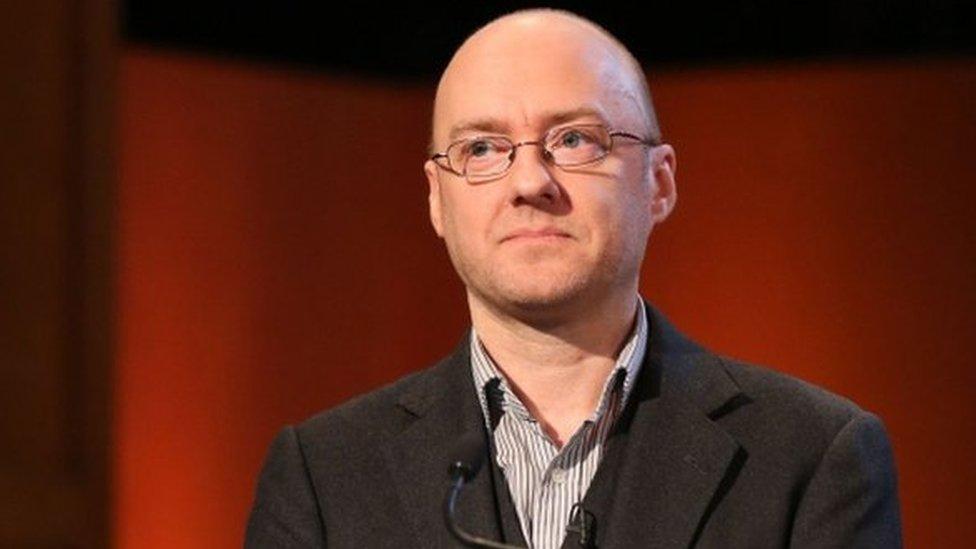
Mr Harvie will stand for the Glasgow Kelvin constituency seat in May
Next up in the David Hume Institute calendar is Patrick Harvie of the Greens. Mr Harvie is an intrinsically optimistic individual and that attribute seems to extend to the party's prospects in May.
The Greens worked with the SNP in the referendum in a fairly companionable fashion. Sometimes more, when they shared the common objective of independence. Sometimes less, when the Greens thought the SNP were too heavy-handed in directing strategy. (The SNP dissent.)
But, for this election, the Greens are adamant that they can provide the "constructive yet challenging opposition" to the SNP which they say is missing at the moment.
Naturally, their policy priorities mainly arise from their environmental driver: opposition to fracking, support for energy efficiency and the like. But, beyond that, they will emphasise social need.
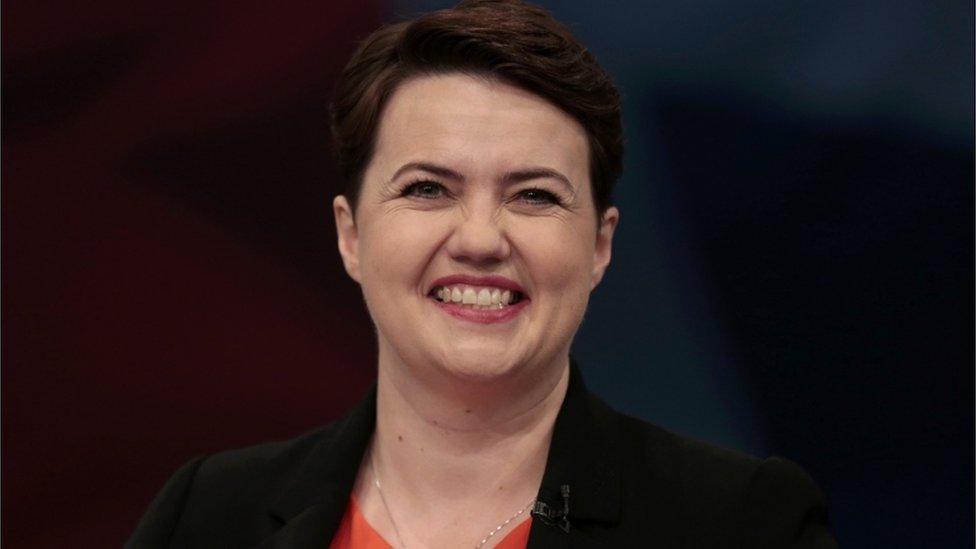
Ruth Davidson aims to lead a revival of the Conservative party in Scotland
Sprint forward with me now to Ruth Davidson's lecture. Will the long-anticipated Conservative revival in Scotland happen in May? Sometime? Ever?
The steep Tory decline can be attributed to a range of factors. But perhaps chief among them was their stance on self-government - or rather the underlying sense of Scottish identity which drove that issue.
As I have noted previously, parties of the right customarily play the patriotic card. The Scottish Tories picked the wrong patriotism for their electoral prospects. Just as the Scots were reaching out to clutch the Saltire, the Tories were eagerly waving the Union Flag. They were increasingly seen as out of sync with Scottish sentiment.
'One Nation' approach
For years now, indeed for decades, they have sought to quell that mismatch. They have emphasised, again and again, their credentials as a Scottish party, with Scottish interests at heart. This election will be no different.
And, as with other parties, the pitch is predicated upon countering the SNP. Ms Davidson says her party will provide "a genuine Scottish alternative" to what she characterises as the "one party state" of SNP governance.
To do this, she offers a "One Nation" approach. (The phrase traces its origins back to Benjamin Disraeli. David Cameron is said to be a fan of the 19th century Prime Minister and novelist; it seems Ms Davidson is too.)
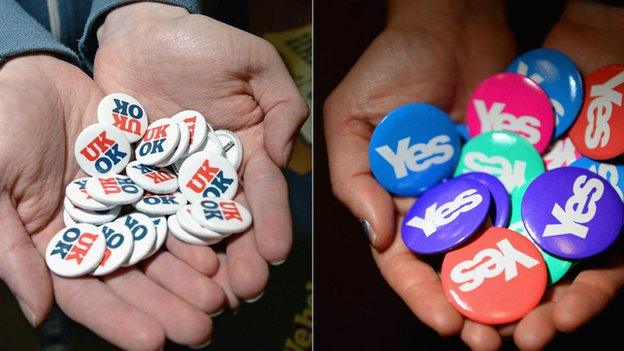
The Conservatives will strive to keep the independence referendum on the agenda - unlike the SNP
Ms Davidson's version of One Nation is "not bowing to the big state on the one hand or genuflecting to the free market on the other." In short, the centre ground.
But she adds another element. Given the chance, she says she would govern in a "moderate, energetic" fashion - while categorically ruling out another referendum on independence. In short, a pitch to No voters and even perhaps wavering Yes voters who don't fancy an early rerun.
Now, Ruth Davidson is upbeat and buoyant at all points. She could give even Patrick Harvie a class in optimism.
But does she seriously expect to be First Minister? Thought you'd say that. Still, she will make her pitch with vigour and take her chances with the votes which ensue.
In which regard, there is occasional talk in Tory circles that they might overhaul Labour in voting share. Labour, of course, dismiss that - and even SNP strategists think it unlikely.
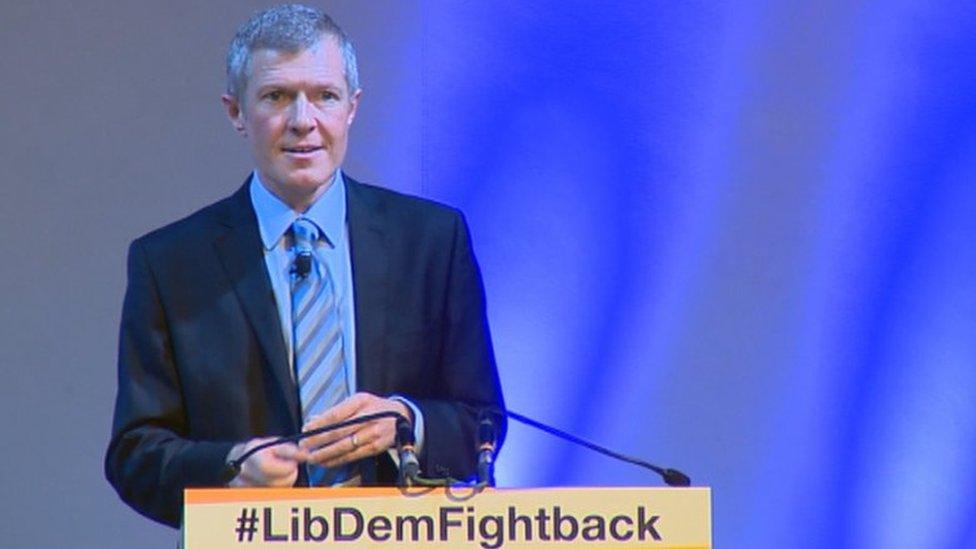
Willie Rennie is known as one of the cheerier characters at Holyrood
To Willie Rennie next, of the Scottish Liberal Democrats.
You thought Patrick Harvie was cheerful? You thought Ruth Davidson was chipper? Mr Rennie outdoes them both.
I suppose, given the recent plight of his party, the options are either to smile broadly and continuously - or to slink off to the cupboard for a quiet cry.
Still, Mr Rennie is frequently effective in parliament; most notably over police service reform and related issues such as stop and search. By pursuing precise issues, firmly and vigorously, he has gained a reputation for challenging ministers, First and otherwise.
'Uplifting campaign'
Will the public listen? Mr Rennie says he will offer a "positive, uplifting" campaign which will "seek to put the divisions of the referendum behind us".
In particular, he will revert to a classic theme for his party and its predecessors; that of liberty. He will argue against "targets, controls and top down diktats" in the public sector which, he says, are "suffocating the talents" of staff.
But, as with others, it is largely targeted at the SNP or rather SNP voters. In essence, he will argue that Yes voters should put that period behind them and listen to the Lib Dem offer on issues such as GP provision, mental health and policing.
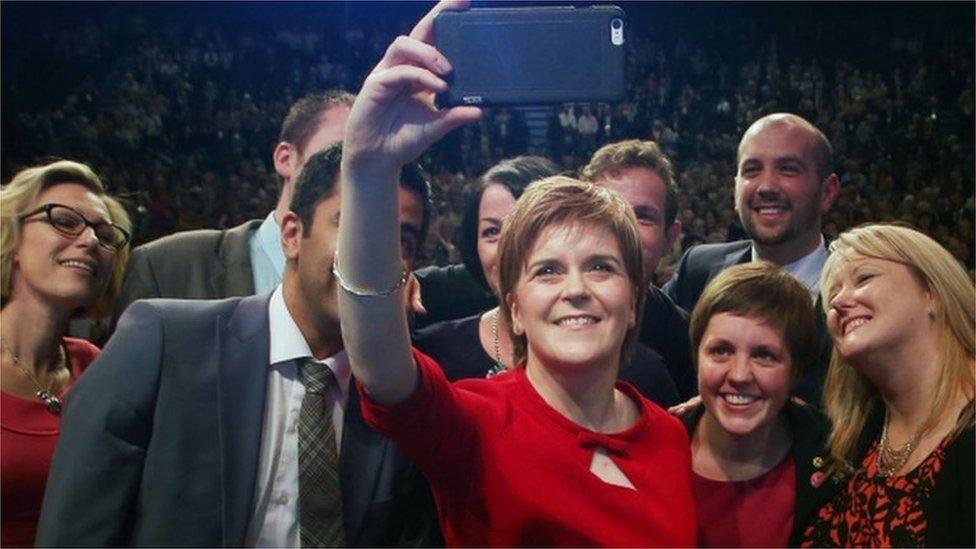
Nicola Sturgeon wants to fight the election on the SNP's record in government
Finally, in March, the David Hume Institute will play host to the First Minister, Nicola Sturgeon. She remains decidedly popular, as does her government, despite the inevitable depredations of administration.
It was once thought inconceivable that any party could win an overall majority at Holyrood in a voting system designed to prevent such an occurrence. Now opinion polls suggest the prospect that the SNP might repeat that feat.
Sturgeon's strategy
The SNP strategy - as promulgated by Alex Salmond - has been to govern moderately and consensually within the limits of devolution while simultaneously inviting the voters to infer how much better things could be with independence.
This has persisted under Ms Sturgeon. She stresses that it will be her government's record - and forward programme - which are placed before the voters in May. Not, immediately, independence.
With regard to the prospect of another referendum, she will pursue the strategy she set out at the party's conference in Aberdeen. She said then that to propose another plebiscite "without strong evidence that a significant number of those who voted No have changed their minds would be wrong and we won't do it."
Nicola Sturgeon said she intends to prove that the SNP are the "best government with the best people, and the best ideas"
She added, however, that if such evidence were to emerge, "then we have no right to rule out a referendum and we won't do that either."
In essence, it will be - for the manifesto and, she hopes, for the election - a decision deferred and driven by the popular will. Naturally, Ms Sturgeon's opponents will seek to place the topic more directly before the people in May, challenging the SNP over their stand.
Economy to the fore
As ever, the economy will be predominant. And, on that, there are significant changes pending. John Swinney opted for a steady budget for 2016/17 - with no use of the additional power available from April to raise income tax.
But that power only allows changes across all rates - with no differentiation between standard and upper.
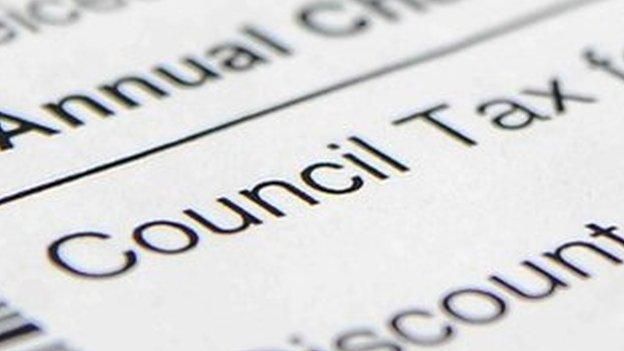
Significant changes could be in the pipeline for the council tax system
The new Scotland Bill will give Holyrood control of all rates and bands. That should be enacted in the New Year, provided the accompanying fiscal framework can be agreed which seems eminently likely, given that it is in the interests of both the UK and Scottish governments to strike a bargain.
In Scotland, then, we would face a debate driven by fiscal change.
A new income tax system. Reform of the council tax: the hints from inside the Scottish Government are that such reform may be substantial, allied to the assignation of a proportion of income tax to local government. Reform of business rates.
All that plus new controls over elements of welfare, also in the Scotland Bill. The SNP, like the other parties, will set out their forward thinking with regard to those extra powers. New powers, new debate.
It will be lively. It will be argumentative. But I am certain it will also be civilised. For, as David Hume noted, "truth springs from argument amongst friends."